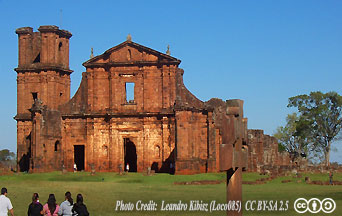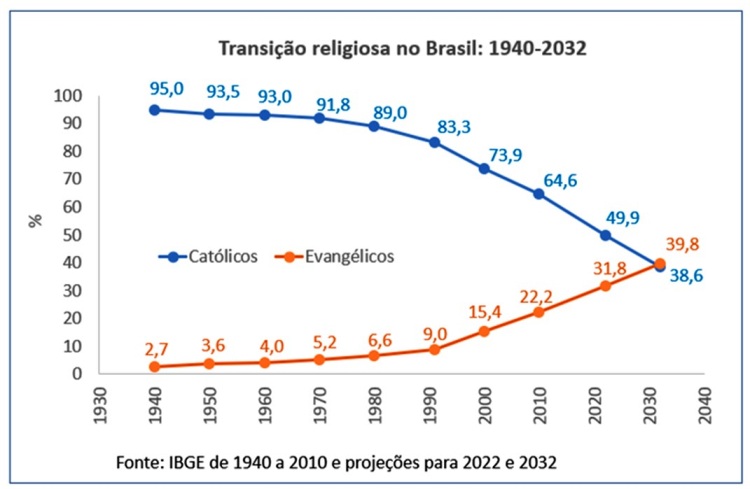
Most Rev. José Luis Azcona, Bishop Emeritus of the Marajó Prelature in the Amazon area of Belém do Pará, Brazil, has sounded the alarm: “The Amazon, at least the Brazilian part of it, is no longer Catholic” because it has “a Pentecostal majority” that in some regions “reaches 80%.”
The reason? Under the pretext of “intercultural dialogue,” Catholic missionaries no longer evangelize or baptize. However, evangelicals do evangelize and work very hard indeed. While Catholic missionaries talk to Indians about “deforestation,” “climate change,” and “integral ecology,” Protestant pastors visit their communities with Bible in hand.
The Instrumentum laboris for the coming synodal assembly theologically justifies this “preferential option” for Mother Earth. They claim the Amazon region is an epiphanic place that manifests the divine.
By emphasizing this option, the synod’s promoters will be repeating the same pastoral mistake that led to the flight of millions of Catholic faithful to the evangelical religion.
When I first visited Brazil, the country’s population was 88.2 million, of whom 92% were Catholic and 5.2% evangelical (1970 census). In 2018, the population more than doubled to 208 million, but the proportion of Catholics dropped to 64.6% as evangelicals rose to 22.2% (figures are worse as the latest available data is from the 2010 census).
A Mission That Baptized No One in Fifty-Three Years
The Flawed Evangelization Model of the Pan-Amazonian Synod
Based on this figure and assuming a similar rate of loss, the Catholic Church lost 57 million faithful over the last fifty years. Worse still, according to the projections of demography Professor José Eustáquio Diniz Alves, at the current rate of “religious transition,” Catholics will likely drop to 50% of the population within the next three years. They will be surpassed in numbers by evangelicals before 2032, as the following graphic shows.

Credit: EcoDebate, CC BY-NC-SA 3.0.
Who is to blame for this crime? The blame can be laid on the famous policy of “preferential option for the poor,” which the Latin American Church adopted in 1968. The evangelicals themselves point this out.
As early as 2001, Time magazine journalist Richard N. Ostling published an article titled “The Battle for Latin America’s Soul,” describing how Catholicism “is facing ‘a serious crisis. As the Evangelical movement grows stronger by the day, the Catholic Church is getting weaker and weaker.’”1
He wrote that “most Evangelicals appear to succeed because they usually preach a purely spiritual message.” To support this hypothesis, he quotes statements by Henrique Mafra Caldeira de Andrada, head of the Protestant Program at Rio’s Institute of Religious Studies, who thinks Catholic advocates of the social gospel failed to realize that “these [poor] people were hungry for more than just food. The Evangelicals met the peoples’ emotional and spiritual needs better.”
Time puts the cherry on the cake by quoting Pastor Nilson Fanini, at the time the highest Baptist authority in Brazil, who declared unambiguously, “The Catholic Church opted for the poor, but the poor opted for the Evangelicals.”
Eternal and Natural Law: The Foundation of Morals and Law
Alan Riding, writing for The New York Times, came to the same conclusion fourteen years earlier: “For many religious experts, while the 1970s will be remembered in Latin America for the dramatic changes in the Catholic Church, which ended its traditional alliance with local elites and declared ‘a preferential option for the poor,’ the 1980’s will be marked by the advance of evangelism.” Linking the two phenomena, he adds, “‘The Brazilian believes in gods, spirits, mysticism, miracles and so on,’ said Richard Sturz, an American-born Baptist missionary who has worked here since 1949. ‘When the Catholic Church began modernizing itself in the 1960s, it eliminated much of the mystery, so it left a vacuum.’”2

While evangelicals filled this void throughout the country, it is now being disputed in the Amazon in a struggle between shamans and evangelical pastors. Instead of abandoning its purely earthly, ecological-Marxist “preferential options” and starting once again to preach the Good News of Jesus Christ, the Pan-Amazon Synod seems bent on backing the shamans against the pastors.
As Edmund Burke put it, “They defend their errors as if they were defending their inheritance.”
More articles related to the upcoming Synod on the Amazon may be found on Pan-Amazon Synod Watch, at https://panamazonsynodwatch.com/.

